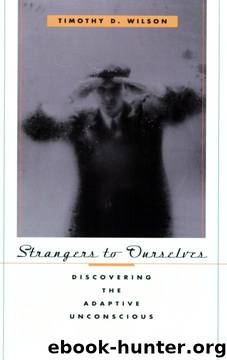STRANGERS TO OURSELVES by Timothy D. WILSON

Author:Timothy D. WILSON
Language: eng
Format: mobi
Published: 2009-09-05T08:22:00+00:00
Sometimes, though, the conscious system gets it wrong. One way this can happen is that people fail to notice that a feeling has changed until their attention is drawn to it. Over a century ago, William Carpenter argued for the existence of such "unnoticed" feelings, such as "the growing up of a powerful attachment between individuals of opposite sexes, without either being aware of the fact." Carpenter noted that "The existence of a mutual attachment, indeed, is often recognised by a bystander ... before either of the parties has made the discovery ... the Cerebral state manifests itself in action, although no distinct consciousness of that state has been attained, chiefly because, the whole attention being attracted by the present enjoyment, there is little disposition to introspection."0
This example meets our "strong suspicion" criterion of a nonconscious feeling, in that people act as if they have a feeling of which they are unaware, observers believe they have the unacknowledged feeling, and the people themselves later acknowledge that they had the feeling (assuming that Carpenter's lovers come to recognize their mutual attraction). Surely, though, the lack of awareness of such strong feelings is temporary. Once people take the time to introspect, they recognize their attraction for another person. In Carpenter's words, the feeling "suddenly bursts forth, like a smouldering fire, into full flame.""
There may be other times when it is more difficult to recognize the feelings generated by the adaptive unconscious, even when people introspect about their feelings. The conscious system is quite sensitive to personal and cultural prescriptions about how one is supposed to feel, such as "children love their pony, and their dog, and their parents, and picnics, and the ocean, and the lovely chocolate cake." People might assume that their feelings conform to these prescriptions and fail to notice instances in which they do not. These "feeling rules" can make it difficult to perceive how one's adaptive unconscious feels about the matter. Because everyone knows that "children love their pony," it is difficult for them to notice that Topper is a nasty brute-not because it would be especially anxiety-provoking to do so, but because it is diffi cult to see through the smokescreen of cultural and personal feeling rules. 12
Download
This site does not store any files on its server. We only index and link to content provided by other sites. Please contact the content providers to delete copyright contents if any and email us, we'll remove relevant links or contents immediately.
Rewire Your Anxious Brain by Catherine M. Pittman(18626)
Talking to Strangers by Malcolm Gladwell(13335)
The Art of Thinking Clearly by Rolf Dobelli(10399)
Mindhunter: Inside the FBI's Elite Serial Crime Unit by John E. Douglas & Mark Olshaker(9304)
Becoming Supernatural by Dr. Joe Dispenza(8189)
Change Your Questions, Change Your Life by Marilee Adams(7724)
Nudge - Improving Decisions about Health, Wealth, and Happiness by Thaler Sunstein(7684)
The Road Less Traveled by M. Scott Peck(7578)
The Lost Art of Listening by Michael P. Nichols(7483)
Mastermind: How to Think Like Sherlock Holmes by Maria Konnikova(7308)
Enlightenment Now: The Case for Reason, Science, Humanism, and Progress by Steven Pinker(7295)
Win Bigly by Scott Adams(7177)
The Way of Zen by Alan W. Watts(6583)
Daring Greatly by Brene Brown(6493)
Big Magic: Creative Living Beyond Fear by Elizabeth Gilbert(5731)
Grit by Angela Duckworth(5585)
Ego Is the Enemy by Ryan Holiday(5398)
Men In Love by Nancy Friday(5221)
The Laws of Human Nature by Robert Greene(5143)
